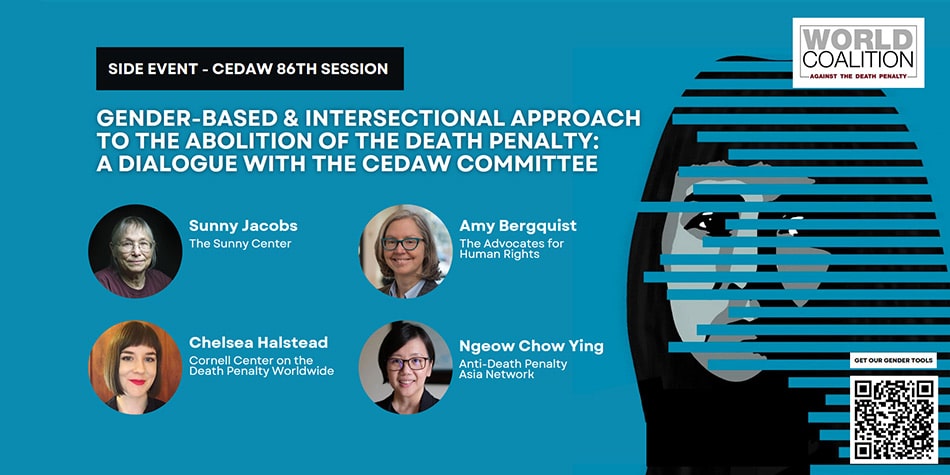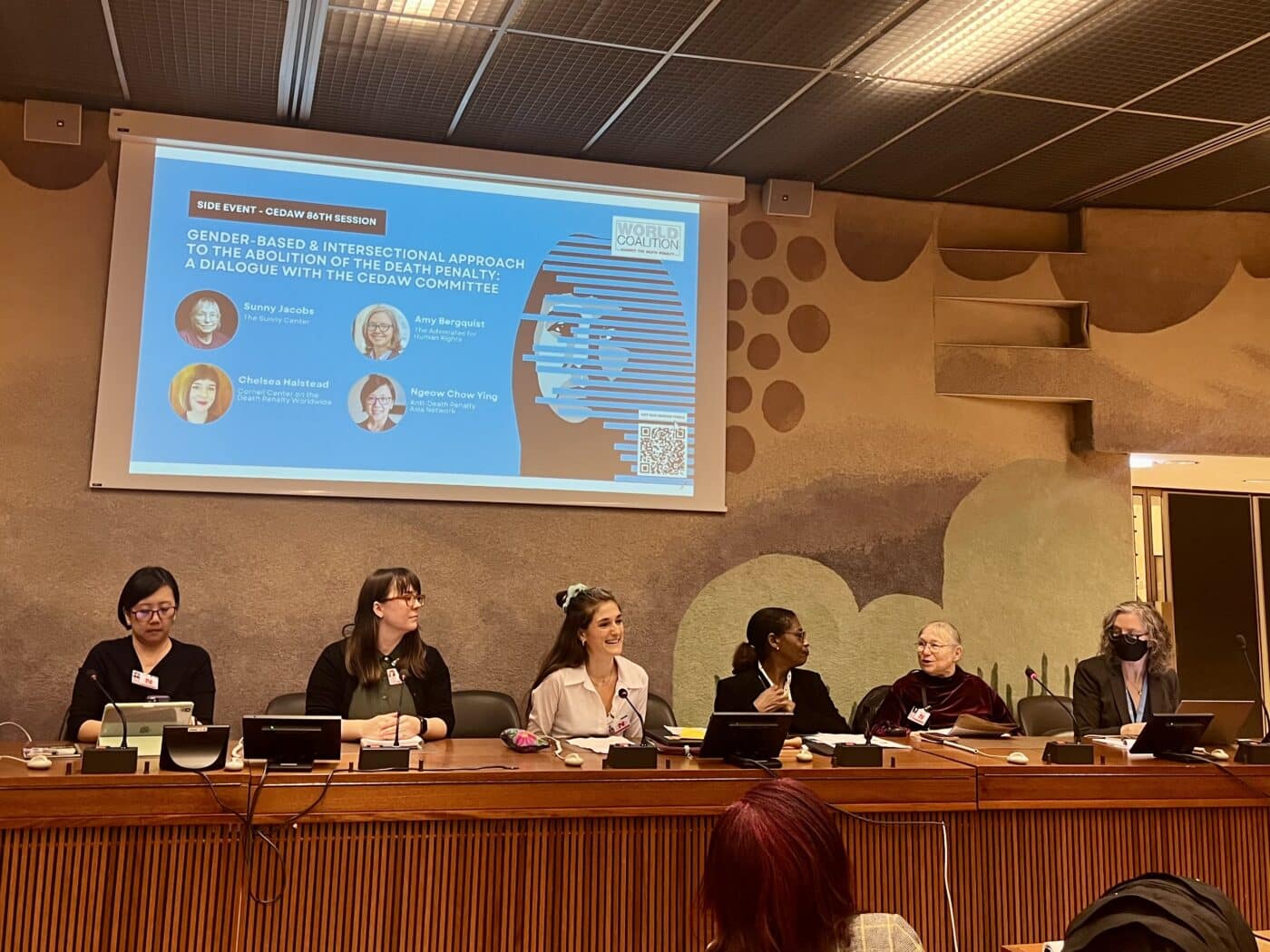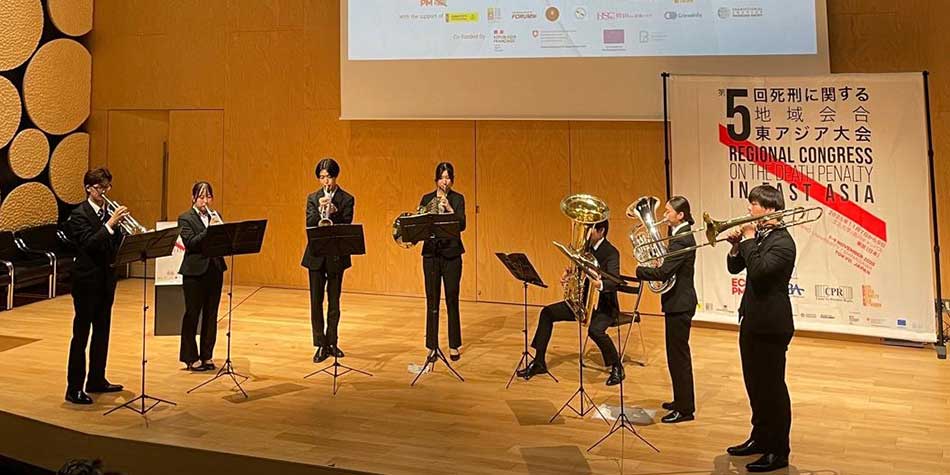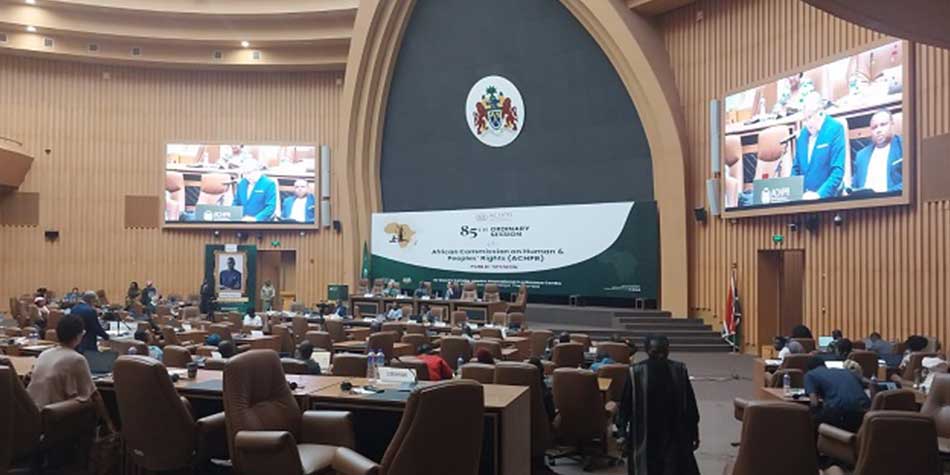
CEDAW experts welcome World Coalition members in the #CEDAW86 side event on gender and the death penalty
Advocacy
On 22 October 2023, the World Coalition Against the Death Penalty (World Coalition) organized a closed-door side event on a gender-based and intersectional approach to abolition as part of the 86th session of the Committee on the Elimination of Discrimination Against Women (CEDAW).
The discussion centered on the various forms of gender-based discrimination surrounding capital punishment. The Committee heard interventions and recommendations from speakers Amy Bergquist of The Advocates for Human Rights, Chelsea Halstead of Cornell Center on the Death Penalty Worldwide (CCDPW), Chow Ying Ngeow of Anti-Death Penalty Asia Network, and exonerees Sunny Jacobs of The Sunny Center Foundation and Sabrina-Butler Smith of Witness to Innocence.
This is not the first engagement of abolitionists with the CEDAW. In fact, since World Day Against the Death Penalty 2021, dedicated to the invisible reality of women on death row, with the coordination and support of The Advocates for Human Rights, around 30 reports on gender and death penalty issues were submitted to the Committee with input from World Coalition members. However, this event is unprecedented as it allowed advocates to directly engage with CEDAW experts on the death penalty outside their formal sessions.
Five main highlights can be put forward from this discussion:
CEDAW should play a key role in filling the data gap on women sentenced to death.
Information is crucial to advocacy, especially in a lesser-known issue like gender and the death penalty. In recent years, abolitionist civil society have collected and compiled some data on the presence of women sentenced to death around the world. However, it is glaringly insufficient. We still have no information on the presence of women on death row in 8 countries and among the 42 countries where women are currently on death row, there are 12 retentionist countries with no precise data on the number of women on death row.
Even in countries where we do have some data, we do not have critical information on the background of women sentenced to death, including the crime(s) of conviction and their relationships with the victim/s or codefendant/s. CEDAW and other treaty bodies have a huge role in filling this crucial data gap.
CEDAW should center an intersectional approach to abolition.
As shown by CCDPW’s 2021 research report, in countries where we do have data, it is clear that most women sentenced to death are from racial or ethnical minorities, are non-literate, come from economically deprived backgrounds, have mental and intellectual disabilities and have experience gender-based violence. Their backgrounds often shed a light on what leads them to commit serious crimes.
According to Amnesty International, in Malaysia, out of all women on death row, 85% are foreign nationals, and all but one are accused of drug-related crimes. As Chow Ying shared, these women migrated to Malaysia for better economic conditions. Most often, they do not know that they are trafficking drugs. They are easily recruited as they are in a difficult economic situation and in desperate conditions.
Sabrina Butler-Smith, the first woman exonerated from death row in the United States, also shared how she experienced misogynoir as a black woman: “I was discriminated against in a way that I had an all-white jury…The district attorney tried to strike as many black jurors as he possibly could…Being on death row, I did not have access to a lot of things. Being a woman was hard especially when you need access to female care. I got sick in the prison. My mom had to go to the media in order for me to get help.”
CEDAW should encourage the consideration of gender-related mitigating factors in sentencing.
According to CCDPW’s 2021 report, across several African nations, women are often sentenced to death for killing their abusers. However, there are generally no mechanisms to consider gender-based violence as a mitigating circumstance.
As Chelsea put it, “women are underprotected by the State when they are victims and overpenalized when they are perpetrators.”
CEDAW should promote gender mainstreaming in the justice system, including the capital punishment process.
In courts, prosecutors, defense lawyers and even judges often rely on sexist stereotypes to analyze a woman’s behavior, relying on patriarchal norms on what it means to be a good mother or wife or a proper woman. As one of Sunny’s jurors confessed to her years later, “one of the reasons they wanted to sentence me to death was to make an example of a woman.”
Once on death row, women do not have access to gender-specific care and suffer from worse conditions. In Texas, for example, women in menopause are put in solitary confinement with no air conditioning and no access to medication for hot flashes. As the only woman on death row in Florida at that time, Sunny spent more than five years in solitary confinement and had less outdoor time and other privileges than men on death row.
Abolitionists should further engage CEDAW on death penalty issues.
CEDAW experts described the intervention as “enlightening” and an “eye-opener” and urged activists to continue engaging with the Committee, including by organizing briefings, regularly submitting reports with hard evidence and directly reaching out to individual Committee members. With this encouragement, the World Coalition will continue to strengthen its work to make visible the intersectional discrimination faced by women in relation to the death penalty, in order to achieve the goal of universal abolition.
Recommendations to the CEDAW Committee:
- Urge governments to publish annually disaggregated data on people sentenced to death by age, age of dependent children (if any), sex, gender, nationality, ethnic group, disability, crime(s) of conviction, date of conviction, date of execution (if applicable), and the relationship between the offender and the victim or any codefendant.
- Recommend that domestic criminal justice systems take full account of any gender-related mitigating factors related to women’s backgrounds, including evidence of trauma, economic pressures, child marriage, domestic and gender-based violence, as well as psycho-social and intellectual disabilities.
- In the case of Malaysia, which is set to be reviewed in February 2024, the Committee should urge courts to consider gender-related factors in the resentencing process.
- Urge States to promote mandatory training on gender-based discrimination and violence, pathways to crime, and gender-sensitive mitigation within the prison and judicial administrations and ensure that women on death row get equal treatment, including through sufficient access to gender-specific care and respect of Bangkok Rules.
To learn how to better engage with human rights mechanisms on gender and the death penalty, access our advocacy tool. You can also read The Advocates for Human Rights’ blogpost on the side event here.

Categories
Gender






